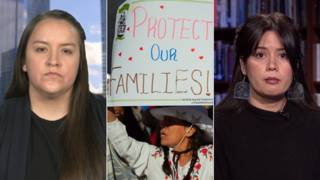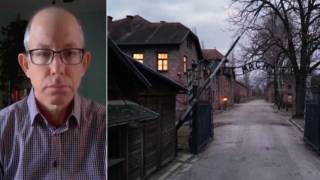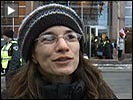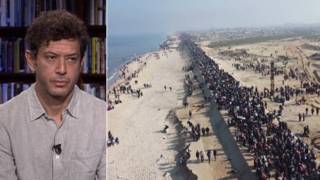
Related
Wisconsin Republican Gov. Scott Walker is expected to propose deep cuts to the state’s health programs for the poor and aid to local governments. Walker has also threatened to start the process of laying off 1,500 state workers unless 14 Democratic senators return to the state and vote to refinance millions in debt. The Walker administration is coming under intense criticism for largely shutting off the State Capitol to protesters ahead of his speech. Democracy Now! senior producer Mike Burke speaks to Frank Emspak, founder and producer of Workers Independent News. [includes rush transcript]
Transcript
AMY GOODMAN: Wisconsin Republican Governor Scott Walker is scheduled to address the state legislature today and call for deep cuts to the state’s health programs for the poor as well as aid to local governments. Walker says the cuts are needed to balance the state’s more than $3 billion budget deficit over the next two years. Despite the deficit, Walker is refusing to consider increasing taxes on the wealthy. In fact, he recently approved more than $100 million in tax cuts.
The Governor has also threatened to start the process of laying off 1,500 state workers today unless the 14 Democratic senators return to the state and vote to refinance millions in debt. The senators left the state nearly two weeks ago in an effort to prevent Senate Republicans from passing the governor’s budget bill that would have removed the collective bargaining rights of most public-sector workers.
Meanwhile, the Walker administration is coming under intense criticism for largely shutting off the Capitol to protesters ahead of his speech. For the past two weeks, hundreds of students and workers have slept inside the Capitol to protest the anti-union legislation. While dozens of protesters slept inside last night, police barred any more protesters from entering the building on Monday. The American Civil Liberties Union of Wisconsin called the banning of protesters during business hours unconstitutional.
To protest the shutdown, several dozen people camped outside one of the entrances to the Capitol last night despite the freezing weather. Police barred the use of tents, so the protesters were forced to huddle together in sleeping bags on the concrete.
On Saturday, Democracy Now! senior producer Mike Burke spoke to Frank Emspak, founder and producer of Workers Independent News. They spoke inside the Capitol just before Saturday’s massive protest that attracted more than 100,000 people to Madison, Wisconsin.
FRANK EMSPAK: Hi. My name is Frank Emspak. I’m the executive producer of WIN, Workers Independent News. And I was a professor at the University of Wisconsin-Extension, School for Workers. And we’re here in Madison, as people can hear. I think — and I was also a longtime union officer and for many years also a machinist at the General Electric Company.
I think that what’s really going to happen here is that it’s true people may get pushed out of the Capitol, but yesterday in the state of Wisconsin — today is Saturday, so it was Thursday — there were probably 40 or 50 cities and municipalities where there were demonstrations and whatnot, including places in the most conservative parts of the state — Cuba City, who knows, right? And then I think we’re having meetings all over in local unions about what should be done if the law passes, what kind of direct action can be done, and what should a schedule of that direct action be.
Now, some of this stuff, of course, the state says you can’t strike. There are a lot of no-strike clauses. But I think if people are faced with the fact we’re taking your rights away — you couldn’t strike in Egypt either, and they’re striking. And we got a call from the head of the Egyptian teachers’ union the other day in our office with a show of support. We had just interviewed him the Friday before this started. And he was talking about Egypt and the fact that they went on strike with or without rights, and that’s what brought the Mubarak regime down. And in part, that’s true. And I think here, what you’re going to see is that people are forced to the wall, and if their rights are taken away, they will find ways to make that clear — legally, illegally, whatever, but from the grassroots. People do not need to be told that there’s a problem.
MIKE BURKE: Now, is there a serious talk about a general strike?
FRANK EMSPAK: Well, there was a motion passed at the South Central Federation of Labor, which is the AFL-CIO’s regional affiliate. There are about 90 local unions that are members. And it was passed with one dissenting vote. It can’t call for a general strike, because the Fed can’t do that. They don’t hold any contracts. But it did set up a mechanism to train people and to educate people about what a general strike should be, with the obvious implication that, sooner or later, there’s going to have to be some kind of direct action, statewide, by all workers, the largest extent possible. So, this is a, I think, a political line in the sand and a very, very interesting thing, because when the international presidents, who actually have big unions, like President Hoffa and President Hill from the IBEW, came here, both of them were asked by us and others, “What do you think?” And their response was, “Well, if that’s what has to happen, that’s what has to happen.” And that’s an extraordinary thing to hear two international presidents endorse — effectively endorse a motion that everybody goes on strike. And I think that’s a message. It’s a message to other working people that, by God, this is serious.
But it’s a message also to the Governor, I hope, that this is not some isolated band of people here. You’ve got 50,000 people. You know, there are national demonstrations that don’t have 50,000 people. The vast majority are from the state of Wisconsin. But now, because of the importance of this, there are people from all over. We were sitting in a restaurant yesterday and bumped into Office and Professional Employee Workers Union — you know, they’re not like the Teamsters; they don’t have a big reputation — who flew in from Seattle to be here with their fellow workers at CUNA Mutual, which is represented by them. And you have people, the SAG, the Screen Actors Guild. I mean, there’s a hundred members of the Screen Actors Guild in the state of Wisconsin, and most of them were here on Wednesday, and they’ll probably be here today. So, you have an upwelling of sentiment from all over. You had 200 city and municipal managers and mayors here Thursday saying to the Governor, “We don’t want this.” We had the veterans here Friday saying, “We don’t want our rights destroyed or our benefits taken away.” We even had a Bishop of the Catholic Church and the Green Bay Packers — how can you go wrong? — have both taken positions against the Governor. So, there has never been a coalition like this.
The Governor did not campaign on this. The Governor campaigned on the budget and did a lot of what the Tea Party does. He said, “We have to cut it,” but would never said where. Well, he gets into office and says, “Well, what I really meant was go after collective bargaining,” which he started talking about a week after the election, and then the list of budgetary cuts all deal with services for working people, particularly the destruction of the BadgerCare, which is like Medicare for relatively low-income people here. The sale of state assets in a no-bid deal? I mean, the Governor may be linked to these energy firms, the Koch brothers, right? And what’s he want to do? There are 18 or 20 state power plants, and he wants to sell them on a no-bid basis to whoever shows up. Maybe you and I should buy a power plant. And so, there’s all these other things in the bill that are extremely harmful long-term to the budget. Plus, he gave out about $140 million of tax breaks in his third week in office. In other words, there is no budget crisis.
I think what’s important for people to see is that this is part of a national attempt to knock unions out of the congressional and presidential race in 2012. If this was just a budget bill, since the unions have already conceded the entire amount and more of what the Governor has requested, then this should be over. But he wants to go after the mechanism of dues collection, the way unions function internally — has nothing to do with the budget, but would bankrupt the unions. So, why do that? The other part is that this is happening — similar legislation is happening in about half a dozen other states. So, three of 10 largest contributors to presidential politics in 2010, 2008, were unions. Those are the targets, both here and elsewhere. So it looks like it’s an attempt, really, to knock people out of the race and basically, I think, in spite of problems within the union movement, to disenfranchise working people.
MIKE BURKE: Can you place this struggle in the history of the labor movement here in Wisconsin?
FRANK EMSPAK: We’ve had a long history, but the labor movement in Wisconsin has always been sort of in a strange position. The public sector workers took 60 years to get collective bargaining rights. And they didn’t get it because of lobbying. The reason we have a municipal act here, which covers the teachers, is because prior to 1979, when it was passed, there were 110 work stoppages and strikes in four years. And so, finally, the municipalities said, “We don’t want to do this anymore.” The same was true with the teaching assistants. There were two strikes at the university before there was a collective bargaining law for them. So, the public sector collective bargaining came to the state not because of lobbying, but because of real commitment on the part of public sector workers to win it. On the other hand, in this state, we have leading right-wing financial organizations, the Bradley Foundation, the Kohler Company, people like that, who have never accepted collective bargaining in the private sector. So, it’s been a mixed bag.
And the other thing here is the complete destruction, or almost destruction, of private sector unions. We’ve lost probably two-thirds of the private sector union membership. And once that happened, those who never accepted collective bargaining went after the public sector and tried to play the private sector workers against the public sector, particularly people who have lost their jobs.
So, the other thing going on here was the election. How did this guy get elected? And he got elected because a lot of working people voted for him, both in the private sector and the public sector, primarily, as far as we can tell, because of aggravation over unemployment and no real leadership there, because of the issue of taxes, which is the only way that working people have increased their family income, is lower taxes, because wages have been stagnant for 30 years. So, you have that, and then you have poor campaigning on the part of the Democrats. The Democratic ticket here was weak and poorly messaged, and then millions and millions of dollars coming in from out of state for Republicans, who started campaigning in June. So, I think that there was — also a lot of people stayed home because they were disappointed about the federal situation. I think they went out and voted for the first time in 2008, didn’t see much except things getting worse, so a lot of young people stayed home.
AMY GOODMAN: Frank Emspak, founder and producer of Workers Independent News, interviewed by Democracy Now!’s Mike Burke. We’ll post the full interview at our website, democracynow.org. They were speaking in Madison, Wisconsin, at the State Capitol Saturday. One hundred thousand people marched against the Governor. Polls now show that if there were an election for governor today of Wisconsin that the majority of Wisconsinites would vote for his opponent. Well, you can go to our website at democracynow.org for all details.












Media Options